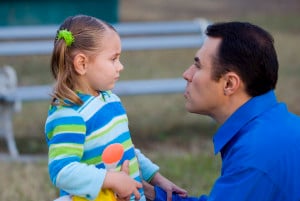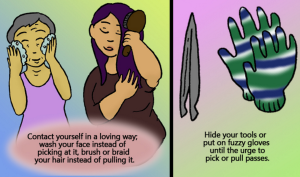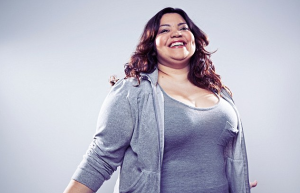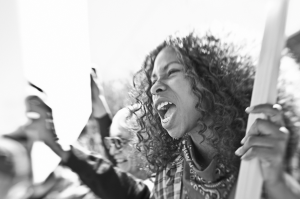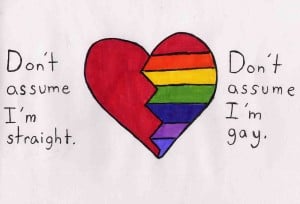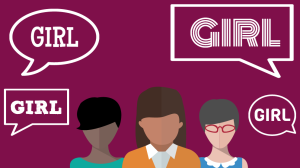In the aftermath of my article on children’s rights to consensual hugging, wherein I posited that no kid should be forced to hug someone when they don’t want to, there was quite a divide from readers as to whether or not I was the Devil.
While some people were pleased with the article – usually on the “Yes! This was what I had to deal with as a kid!” side of things – disapproving responses to the article included “You have no right giving parental advice when you’re not a parent” and “I know what’s best for my child.”
To be fair, it was my bad for putting the cart before the horse, creating an article on childhood consent before writing about the reason why such an article was necessary to begin with.
But I wasn’t surprised by the backlash, for it was the exact reason I’d written the article in the first place: because adultism is running amok in America.
And the negative comments above are actually perfect examples.
Parents know what’s best for their children? At the risk of tossing tons of other scenarios aside, we LGBTQIA+ kids have heard that last one plenty while trying to grow up while out. Parents say we’re not bi. Or queer. Or a boy. Or non-binary.
They give us labels at birth and expect us to adhere to them. And when we don’t? Certainly it’s because our parents simply know us better than we know ourselves.
It couldn’t possibly be that parents are — gasp! — people who are ultimately a different being than their children.
But what of my suggested inability to provide parental advice when I’m not a parent myself? Okay, I give you that one. But the thing is that article wasn’t on parental advice.
It was an article on children’s basic human rights, which we tend to so grossly overlook.
How did that point so quickly get turned right back around to focus on the parents instead of the children?
Because adultism.
Parenting is hard as shit, though. I want to make that very clear to any grossly misinformed person reading this right now who thinks otherwise. You could be the illegitimate child of Mother Theresa and still come up with a laundry list of things Mama T did wrong by you.
It’s just how parenting goes. You have my empathy on that. Everybody makes mistakes, and parenting in particular seems rife with such possibilities as parents wade their way through raising a child.
But it’s the inability to recognize or own up to those mistakes that causes a massive problem.
The thing about adultism is that it keeps your mind closed. Whether it be from fear of being called a bad parent, the inherent shame of feeling a parent has done wrong by their child, or some sort of empathetic disconnect keeping a parent from viewing their child as a fellow human, sometimes parents outright refuse to acknowledge that they’ve made a mistake. Even if acknowledging that mistake could help the parent treat their child better in the future.
Adultism can be a form of abuse against children, however accidental, unintentional, or well-intentioned.
Adultism is the belief that children are the property of their (often genetic) adult counterparts that can be used at will – instead of seeing kids as small humans who have their own thoughts, beliefs, personalities, and interests, and therefore are entitled to the same basic human rights as adults.
Like not dying due to the anti-vaccination beliefs of parents, to provide a current example.
We live in a culture that largely believes that children are to be wholeheartedly owned by their genetic counterparts (even if they intrude on the lives of adoptive or non-genetic parents) as a form of — I don’t know — protection? I’ve never quite understood the logic myself.
But here’re the bare bones: Parents (and parental figures) are absolutely responsible for the well-being of a child. But they are not the almighty powers that have the right to dismantle children until they fit their own desires.
That’s not what children are for.
Still not sure you buy into this whole “adultism” thing? Okay. Here are some examples of adultism, then, that play out in our everyday lives.
1. Children Solely Existing to Accessorize an Adult
Children don’t exist to make an adult feel complete, worthwhile, or fulfilled.
They will not save your marriage. They will not get your significant other to stop abusing you. They will not cure your depression. They will not make you the societal elite against those who are physically incapable of or don’t want to raise children.
It really sucks to be treated like a thing (in case you weren’t aware). And to additionally have such a heavy burden placed upon you the moment you’re out of the womb?
Parents in these situations are doing nothing more than setting their children up for some pretty intense, guilt-ridden failure.
If you’re experiencing any sort of situations like the above, my heart truly goes out to you. These are terribly difficult problems to handle, and sometimes we’ll grasp at any hope to make things better. But I implore you to find healthy, realistic ways of tackling these complex issues.
Don’t dump it upon a tiny creature whose natural existence will, in fact, exacerbate those very problems you’re looking to solve.
Talk about a breeding ground for resentment.
2. Children Being Flaunted as Status Symbols
Children aren’t status symbols that make you superior to your non-parent peers. Or more superior to parents who have fewer children than you. And it seriously doesn’t matter that Johnny made quarterback or Susie got straight A’s – outside of the fact that Johnny made quarterback or Susie got straight A’s.
Are you in your right to be proud of your child’s accomplishments? Of course you are. It’s fantastic that you’d be so thrilled with all your child can do that you’d want to stop strangers dead in the street to tell them.
But the difference is you need to be telling people because you’re so proud, not because you want a notch you can put in your competitive belt against other adults.
And if you in turn are feeling jealous over the accomplishments being flaunted by the parents of other children, learn how to swallow it and recognize (and praise) your child for their own individual talents.
Not everyone is physically built for quarterback. Not everyone is academically inclined for A’s. There are a ton of other ways to be awesome.
And if other parents can’t agree to the unique beauty of your own child, then screw them. The problem isn’t that your child isn’t good enough. The problem is you keep shitty company.
3. Children Being Raised as a Mini-Me
Children do not (and will not) like the things you like, do the things you do, or be the people you want them to be just because you say so. If this were the case, there’d be way fewer homeless LGBTQIA+ kids. And way more doctors.
Love your kid exactly as they are. I can’t believe it’s necessary for a non-parent to shout this to parents at large, but love your kid exactly as they are.
But the truth is it really sucks when someone doesn’t end up being the person you wanted them to be. If they’re a different sexual orientation or different religious affiliation or different Pokémon master, sometimes we can be left disappointed.
I mean, it’s bad enough when it’s just someone you’re making googly eyes at. But when it’s your own kid? After you spent all that time and effort raising them? Ouch. That has to be a tough adjustment.
But as disappointing as that can be, parents need to keep in mind a very important thought: Just because your kid didn’t end up like you doesn’t mean you should stop loving them and treating them with respect.
To stop caring for them, become passive-aggressive toward them, or otherwise remove them from your life means that your love for your child was, in fact, conditional.
The question of whether or not parents are supposed to have only unconditional love for their children is irrelevant. What matters is your owning up to the fact that you love your child conditionally if you indeed do.
If anything – anything – is coming between you and the unconditional love for your child, then that thing is the problem. Not your kid.
If you see yourself as a parent with unconditional love for your child, then you need to toss out the thing that’s making you think your child is anything other than phenomenal.
4. Thinking Your Children Owe You Because You Provided Them the Basics of Life
Your children are not in your debt because you provided them the basics of human care. Food? Water? Shelter? Whoop-dee-freaking-doo, you’re not abusing someone.
And thinking they owe you for life because you, in turn, gave them life? Whoop-dee-freaking-doo, a sperm cell smashed into an eggy.
Again, parenting is a tough – and often thankless – job. Children should, indeed, be grateful for all the good their parents have given them.
But to only care for a child in the anticipation of the parent getting something out of it – other than a supported child – brings us back to the situation of conditional love.
Just because your grown child doesn’t want to paint your house this weekend doesn’t mean you should bring up the fact that you were in labor with them for fourteen hours.
That’s called manipulation. And just because your kid may or may not be an ass doesn’t make it okay to do.
In the end, you chose to take on this role as parent in whatever form that choice came about (and yes, there are several factors that can come into play for such a decision).
In which case, you need to buck up and own to the fact that this child is your responsibility. It’s not like you were caught off-guard by the fact that children need food to live.
And if you’re one of those unfortunate folk who, in fact, didn’t choose the role of being a parent, I truly extend my sympathies for the hell you’ve probably gone and are continuing to go through. In all the factors available in choosing to become a parent, there are plenty of opportunities for it to go horribly wrong. And that’s not fair to you in the least.
But that still doesn’t give you the right to view your child as your own lifetime servant. I’m sorry, it doesn’t.
5. Excusing Parental Abuse Since It’s From Parents
Children do not have to withstand parental harassment or abuse, whether it be physical, sexual, emotional, psychological, spiritual, manipulation, gaslighting, aggressive, or passive-aggressive.
Seriously. The fact that this needs to be said at all is quite sad.
Because often, when a parent abuses a child in certain ways, the abusive acts have been known to be poo-pooed away by fellow adults as acts of love.
I still can’t understand this concept myself, but I’ve seen it unfold plenty in the world around me with all sorts of people. Best I can figure is it loops back into the concept of children being the commodities of their parental figures. And as such, they can be treated any ol’ way the parents see fit, outside of gross, easily notable levels of neglect or physical assault.
Since 76.6% of child fatalities are done by the hands of parents (nearly half due to neglect alone), maybe we should, you know, take abuse from parents a little more seriously? Just a thought.
6. Regarding Rules as a Form of Parental Power
Children are not to be given rules as a way of wielding your power over them, but as a way of teaching them how to not unnecessarily or unfairly step on the toes of others in the world.
A parent’s job is to show a child how to be awesome in the world, not how to be awesome to only the parent.
(Subtext: You are not the world.)
Try to view the lessons you teach your kids as a way of showing them how to treat others with compassion, kindness, and empathy, not as a way to make them respect you.
(Also, newsflash: Fear doesn’t glean respect. It creates non-consensual submissiveness at best, which has nothing to do with respect.)
Respect from children is earned through mentorship and support, not through force and fear.
Don’t be your kid’s first bully. They’ll have plenty of those out in the world.
And if you become a safe haven for your child at home, they’ll not only learn how to handle life’s knocks in a healthy way, but love you for teaching them.
If the idea of using rules and lessons as a way to nurture your child into a compassionate human being as you provide them a safe home baffles you, you need to ask yourself why you wanted a kid to begin with: Why the need to grow a personal crop? And why did you feel those needs were justifiable in growing said crop for your own agenda?
7. Viewing Children as Having Fewer Rights Than Adults
Children have as many human rights as you do. Just because they’re miniature doesn’t somehow make them less than worthy.
If this doesn’t make sense to you, I suggest you start back up at the top of the article.
***
Most adultists distract from the issue of adultism by arguing about who has inherent ownership of a child: the (genetic) parent or the government. Governmental ownership, some adultists argue, is damaging to both children and families.
Yup. It most certainly can be. But it’s not because public schools have a children’s book about two gay dads available in the library; it’s because children aren’t supposed to be owned at all.
Children are supposed to be cared for. Children are not meant to be vehicles for one’s personal or political agenda, no matter how noble you feel your views are.
Once you swap your argument of your child’s rights to your ownership of your child, we have a serious problem.
Ownership of a fellow human creates dehumanization of that fellow human. By “owning” your child, your child does not somehow now have more rights. It just means you have more right to tell them what to do.
The argument against adultism isn’t who has the right to own a child. The argument is children have the right to not be owned at all. The focus needs to be on care, not ownership.
This is not parenting advice. This is how-to-not-destroy-another-living-creature advice.
This is how-to-treat-humans-with-kindness-and-respect-by-starting-in-the-home advice. Understanding this difference is a massive first step in viewing your child as—well—human.
As a parent, you’re taking care of a tiny person until they’re capable of taking care of themselves. That’s it. That’s your job.
You are bringing and/or raising a child in this world under the belief (and acceptance) that they may disappoint you, leave you, or otherwise be a person you’re not particularly fond of. No matter how you raise them, they will ultimately be outside of your control.
And that’s something you should not only be okay with, but be something you find utterly beautiful.
Congratulations! You’ve raised an independent human being!
[do_widget id=’text-101′]
James St. James is a Contributing Writer for Everyday Feminism. He works as a transcriber for super-duper secret projects, tends to keep to himself, and is currently pitching a novel that scares agents. He uses his experiences as a way to reach out to others, usually by way of not keeping his mouth shut. When he’s not busy making cis gender people uncomfortable with his trans gender agenda, he likes to play vintage video games and eat candy. You can praise him on Twitter @JamesStJamesVI. Read his articles here.
Search our 3000+ articles!
Read our articles about:
Our online racial justice training
Used by hundreds of universities, non-profits, and businesses.
Click to learn more


